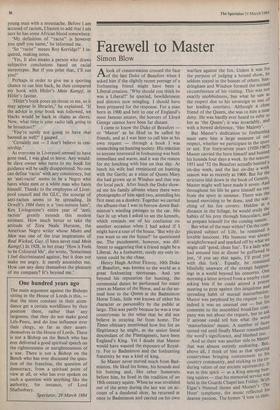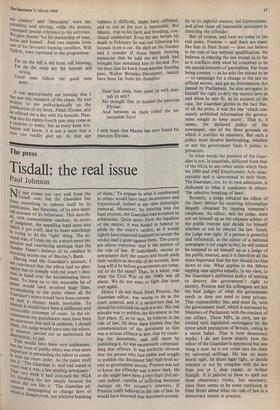Farewell to Master
Simon Blow
Alook of consternation crossed the face of the late Duke of Beaufort when I asked him if the slightly recent peerage of a foxhunting friend might have been a Liberal creation. 'Why should you think he was a Liberal?' he queried, bewilderment and distress now mingling. I should have been prepared for the response. For a man born in 1900 and heir to one of England's most famous estates, the horrors of Lloyd George cannot have been far distant.
I came to know the Duke of Beaufort — or 'Master' as he liked to be called by friends, and as I was later to call him at his own request — through a book I was researching on hunting society. His reaction to anyone interested in foxhunting was both immediate and warm, and it was the reason for my lunching with him on that day. At lunch his wife had reminisced on hunting with the Garth; as a niece of Queen Mary she had grown up at Windsor and that was the local pack. After lunch the Duke show- ed me his family albums where there were photographs of him aged two, attending his first meet on a donkey. Together we carried the albums that I was to borrow down Bad- minton's winding passages to the car. His face lit up when I asked to see the kennels, which reminds me of his confusion on another occasion when I had asked if I might have a tour of the house. 'But why do you want to see the house?' he questioned me. The puzzlement, however, was dif- ferent to suggesting that a friend might be a Liberal. As a foxhunter, surely my only in- terest could be the chase.
Henry Hugh Arthur Fitzroy, 10th Duke of Beaufort, was known to the world as a great foxhunting sportsman. And yet beyond his reputation for hunting, the ceremonial duties he performed for many years as Master of the Horse, and as the an- nual host to the Queen at the Badminton Horse Trials, little was known of either his character or personality by the public at large. This was partly because he was a true countryman in the sense that he did not believe in straying far from home. The Times obituary mentioned how but for an illegitimacy he might, as the senior lineal descendant of the Plantagenets, have been England's King. Yet I doubt that Master would have wanted the exposure of Royal- ty. For to Badminton and the foxhunting fraternity he was a kind of king.
So Master never moved much from Bad- minton. He liked his home, his hounds and his hunting and, like other Somersets before him, he lived in the tradition of an 18th-century squire. When he was invalided out of the army during the last war on ac- count of a duodenal ulcer, he returned at once to Badminton and carried on his own warfare against the fox. Unless it was for the purpose of judging a hound show, he seldom stayed in the houses of others. San- dringham and Windsor formed the normal circumference of his visiting. This was not exactly snobbishness, but what he saw as the respect due to his sovereign as one of her leading courtiers. Although a close friend of the Queen, she was to him a near deity. He was hardly ever heard to refer to her as 'the Queen'; it was invariably, and with a bowed deference, 'Her Majesty'.
But Master's dedication to foxhunting must earn him a large measure of our respect, whether we participate in the sport or not. For forty-seven years (19201967) Master carried the horn himself and hunted his hounds four days a week. In the seasons 1951 and '52 the Beaufort actually hunted a six-day week, and the last six-day a week season was as recently as 1969. But for the strictures laid down in the book of Genesis, Master might well have made it seven. And throughout his life he gave himself no rest from the sport in summer. There was the hound exercising to be done, and the wat- ching of his fox coverts. Hidden at a distance in the foliage, he would study the habits of his prey through binoculars, and so prepare himself for the coming season' But what of the man within? On the corn- plicated subject of Life, he remained a lovable innocent. His humour was alwaYs straightforward and sparked off by what we might call 'good, clean fun'. To a lady wh,c1 had amused him at dinner he guffawed In jest, 'if you say that again, I'll prod .You with this fork'. Equally, he remained blissfully unaware of the strange halWen- ings in a world beyond his concerns. One morning a letter arrived from a nearby vicar asking him if he could attend a praYer meeting to pray against this iniquitous and spreading habit of mutual masturbation.
fo! Master was perplexed by the request
indeed it was an unusual one — Out Ills comment to the assembled breakfast com- pany was not about the request, but to as if anyone could tell him what the wor° 'masturbation' meant. A number of faces turned red until finally Master remembered the word's significance, and blushed too. And so there was another side to Master that was almost entirely endearing. But, above all, I think of him as that sporting countryman bringing contentment to his country community, and sticking to the en- during values of our ancient squirearchY. It was in this spirit — as a King among hun- ting squires — that his memorial service was held in the Guards Chapel last Friday. vVith Elgar's Nimrod theme and Mozart's 111,e Hunt' symphony, the music reflected his dearest passion. The hymns 'I vow to thee,
my country' and 'Jerusalem' were im- perialistic and stirring, while the prayers contained special reference to his activities. We gave thanks 'for his mastership of man, horse and hound'. And two stanzas from one of his favourite hunting versifiers, Will Ogilvie, were reprinted in the programme: Far on the hill is the horn still blowing, Far on the steep are the hounds still strung. Good men follow the good men gone...
It was appropriately out hunting that I last saw this monarch of the chase. He had written to me enthusiastically on the Publication of my book, Fields Elysian, and he offered me a day with his hounds. Hun- ting into his eighty-fourth year may come as a surprise to many, but as every keen fox- hunter will know, it is not a sport that a man can readily give up. At that age
balance is difficult, limbs have stiffened, and to rise at the trot is impossible. But Master, true to his faith and breeding, con- tinued undeterred. Even the day before his death in February he was out following his hounds from a car. He died on the Sunday and I wonder if those happy hunting memories that he told me my book had brought him sustained him to the end. For the lines that he knew from another hunting poet, Walter Bromley-Davenport, cannot have been far from his thoughts: Dear lost ones, how came ye with mor- tals to mix? Me thought that ye hunted the pastures Elysian And between us there rolled the un- jumpable Styx!
I only hope that Master has now found his pastures Elysian.















































 Previous page
Previous page